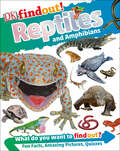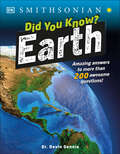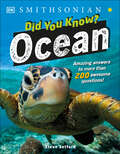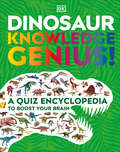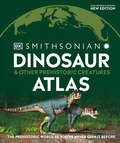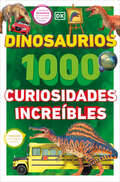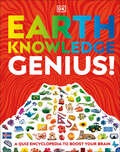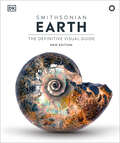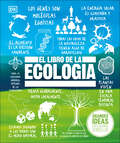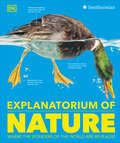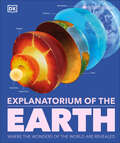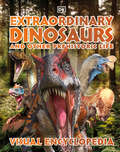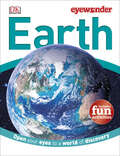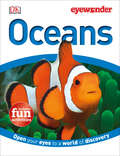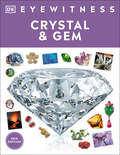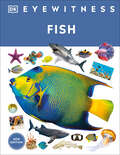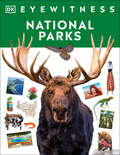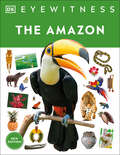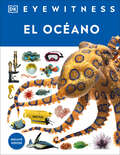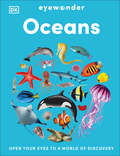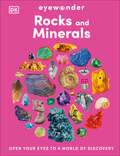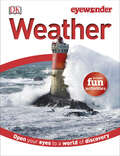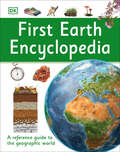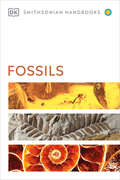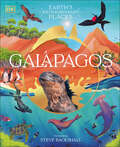- Table View
- List View
DKfindout! Reptiles and Amphibians (DK findout!)
by DKSupporting STEM-based learning, this fact-filled book for lizard lovers ages 6–9 is the ultimate guide to reptiles and amphibians from across the globe, entertaining and educating young readers through a combination of close-up images, quirky trivia facts, quiz questions, and fascinating tidbits on everything from turtles to tree frogs.What is the difference between a reptile and an amphibian? How do chameleons change their colors? How many types of frogs and toads are in the world today? Find out the answers to these questions and more in DKfindout! Reptiles and Amphibians, which features stunning wildlife photography of these animals in their native environments, throughout every stage of their life cycles. Beginning with a broad overview of taxonomy and biology, this book teaches young herpetologists what separates reptiles and amphibians from other branches of the animal kingdom, while in-depth sections on particular species show how animals have adapted to their surroundings with different mating behaviors and defense mechanisms. From chameleons to Komodo dragons, DKfindout! Reptiles and Amphibians captures the breadth of this wriggling, slithering world in a unique and fun way.Vetted by educational consultants, the DKfindout! series drives kids ages 6–9 to become experts on more than 30 of their favorite STEM- and history-related subjects, whether Vikings, volcanoes, or robots. This series covers the subjects that kids really want to learn about—ones that have a direct impact on the world around them, like climate change, space exploration, and rapidly evolving technology—making learning fun through amazing images, stimulating quizzes, and cutting-edge information. The DKfindout! series is one that kids will want to turn to again and again.
Did You Know? Earth: Amazing Answers to More than 200 Awesome Questions! (Why? Series)
by DKAn exciting children&’s encyclopedia that answers explosive geography questions about volcanoes, earthquakes, oceans, and more.Did you know that the Earth&’s largest waterfall is underwater, or that mountains grow? Our incredible planet is much more complex than young minds could ever imagine! Did you know? Earth is a thrilling encyclopedia for children aged 6-8 with a fascination for our planet and how it works. Packed with colorful illustrations, fun facts and quiz boxes, this encyclopedia helps children grasp the science behind our incredible planet. Did you know? Earth takes a unique approach, tackling important issues such as global warming and plastics in the ocean, alongside core geography topics, so children can learn all about how nature works and discover what we can do to look after planet Earth.This fascinating children&’s encyclopedia about the Earth:- Answers more than 200 questions, such as, &“Does land stay still?&” and &“How do raindrops make a cave?&” in an engaging question and answer format- Features stunning photographs and illustrations alongside fascinating facts - Structures each page around a question that a child might ask, providing young readers with a reassuring route into the subject- Includes &“Quick quiz&” boxes to test the reader on trivia- Has a fresh and simple design making each page easy to navigateHelp curious minds find out the answers to all the questions they may have, and some they haven't thought of yet! Can you freeze in a desert? Can humans make it rain? Is there life on moss? Covering amazing landforms, deep-sea wonders, and awesome weather, this encyclopedia helps early learners to understand the science behind our extraordinary planet.
Did You Know? Ocean (Why? Series)
by DKExplore the intriguing answers to more than 200 questions about oceans and seas in this absorbing encyclopedia of the natural world for kids. What is an ocean? How do waves form? What lives at the bottom of the sea? This children's ebook helps inquisitive minds find out the answers to all the questions they may have about seas and oceans, and some they hadn't thought of! Featuring amazing sea creatures, geological wonders, and marine exploration, How Deep is the Ocean? lets children dip their toes into oceanography and explore its incredible depths. Each page asks and answers a different question, and features a quick quiz designed to cement new knowledge. Bursting with mind-boggling details and fascinating facts, this visually stunning book will be treasured by every young ocean enthusiast.
Dinosaur Knowledge Genius: A Quiz Encyclopedia to Boost Your Brain (DK Knowledge Genius)
by DKPut your dinosaur knowledge to the test with this brilliant quiz book for kids!Introducing Dinosaur Knowledge Genius! - a brilliant quiz book packed with over 80 topics on the fascinating prehistoric world of dinosaurs. Which were the most fearsome predators? How big were the most gigantic plant-eaters? Why did so many dinosaurs have frills, crests, or spikes? Did dinosaurs really lay eggs? Which ones had feathers? If you want to know the answers, then this may be the book for you! Take on this brain-busting challenge about prehistoric life.This dinosaur quiz book for children aged 9-12 offers: - Plenty of quiz questions throughout the book to put your knowledge to the test.- Interactive &“Test Yourself&” panel lists with three levels of difficulty - starter, challenger, and genius.- Impressive dinosaur graphics that jump out at you on every page.- A variety of fun facts, picture puzzles, and quiz questions to keep kids entertained and engaged.As you hop from one dinosaur species to the next, you will learn all about the fascinating prehistoric world in this entertaining quiz book for kids and the whole family to enjoy. The pages are packed with eye-popping pictures and the "Test Yourself" panels list the type of dinosaur you&’re looking for on the page. With three levels of difficulty, the challenge gets harder from Starter to Challenger and the truly tricky Genius category. There's a fun fact with every picture to give a helpful clue.At DK, we believe in the power of discovery. So why stop here? Why not put your general knowledge to the test with other books in the Knowledge Genius series? Try General Knowledge Genius! to learn about everything, explore the animal world with Animal Knowledge Genius! or explore our planet with Earth Knowledge Genius!
Dinosaur and Other Prehistoric Creatures Atlas (DK Where on Earth? Atlases)
by DKWho&’s ready for a round-the-world trip of epic dinosaur proportions? Pack your bags, and let&’s go!On this adventure, you&’ll travel back in time to see more than 40 dinosaurs come to life! The geography book for kids explores each continent, revealing fossil sites and stories on every map. A unique children&’s atlas that brings weird and wonderful prehistoric animals into your living room! It includes: • Each chapter explores a continent, showing where dinosaurs appeared at a given time. • Connects each dinosaur to a period — Triassic, Jurassic or Cretaceous. • Specially commissioned maps and 3D locator globes link the prehistoric world to the present-day. • Stunning double-page spreads show dinosaurs and other prehistoric animals in dynamic scenes. • Perfect for children ages 9 and up who want to know more about dinosaurs, ice age animals and other prehistoric creatures. • A face-to-face experience with fearsome dinosaurs! Inside the pages of this children&’s educational book, you&’ll get to stare down a T-Rex in North America, watch out for Velociraptors' slashing claws in the Gobi Desert and trek across the Siberian tundra! You&’ll also discover the answers to fascinating questions about dinosaurs. Which plant-eater weighed as much as five elephants? Where was mighty Tyrannosaurus the ultimate hunter?Using specially commissioned maps, the dinosaur atlas for kids reveal the prehistoric world as never before! A modern 3D globe next to each map helps you understand the arrangement of the continents over time and why paleontologists find fossils where they do. The fully updated edition includes the most up-to-date theories and discoveries of dinosaur science, alongside stunning CGI illustrations and maps of all the major fossil sites around the world.Dinosaur and Other Prehistoric Creatures Atlas is so much more than just a book filled with cool maps, stats and fun facts for kids, it&’s also a vital source of learning — perfect for children to dip into for school projects! Look out for more titles in this series from DK. Discover planet Earth as you've never seen it before in What's Where on Earth?
Dinosaurios: 1000 curiosidades increíble (1,000 Amazing Dinosaurs Facts)
by DKDescubre fascinantes datos y curiosidades sobre los animales que habitaron la Tierra hace millones de años y sorprende a tus amigos y familia.¿Sabías que el dinosaurio más grande que ha existido media tanto como cuatro camiones de bomberos uno detrás de otro? ¿O que el más pequeño pesaba menos que una cucharita de azúcar? ¿Quieres saber cuánto medían las alas del reptil volador más grande jamás descubierto? Sumérgete en las páginas de este divertido libro sobre dinosaurios y descubre todo sobre estas criaturas prehistóricas: cuánto medían las garras del Therizinosaurus, qué dinosaurio tenía el cerebro más pequeño, cuál tenía los dientas más afilados y ¡mucho más!El regalo perfecto para saciar el apetito de saber de los niños de un modo divertido: - Contiene más de 1000 curiosidades en formato de pregunta y respuesta.- Escrito de forma clara, con explicaciones entretenidas e impresionantes imágenes generadas por ordenador.- Con estadísticas alucinantes explicadas por medio gráficos y comparaciones visuales para entender los datos de forma fácil.Un divertido libro ilustrado para niños de 9 años o más, repleto de sorpresas y curiosidades alucinantes para que los jóvenes lectores descubran el maravilloso mundo de los dinosaurios.------------------------------------------Astonish your friends and family with this incredible collection of mind-boggling facts about the scariest animals ever to walk the Earth.Did you know that the largest dinosaur was four times longer than a fire engine but its babies were the size of geese? Or that the smallest dinosaur weighed less than a teaspoon of sugar? Or that the largest flying reptile was as tall as a giraffe with wings the size of a fighter jet? This fascinating first dinosaur book for kids is packed with bite-size nuggets of unbelievable information. Find out which dinosaur had the sharpest teeth, the longest claw and the smallest brain.Dive into the pages of this kids dinosaur book to discover: - 1,000 jaw-dropping, mind-blowing facts to wow your family and friends.- Stunning CGI images to convey statistics in an intuitive way that kids can understand.- Factfile spreads are packed with infographics and key facts on all kinds of prehistoric life.- Photo stories feature the world's spectacular fossils, from dinosaur footprints and nests to complete skeletons.- Fun, accessible text written to excite and entertain children and adults alike.Discover the fastest, the slowest, the deadliest, and the downright weirdest dinosaurs ever to roam the planet, in this dinosaur gift book for children aged 9+.
Earth Knowledge Genius! (DK Knowledge Genius)
by DKA brilliant quiz book for clever kids – put your knowledge about planet Earth to the test and dazzle your family and friends with your brainpower!Can you find the Red Sea, Black Sea, and Yellow Sea on a map? Do you know what makes the Gobi Desert different from the Sahara? No? Then this is the book for you!Earth Knowledge Genius! is packed with more than 60 topics, including the highest mountains, largest deserts, most extreme weather, breathtaking natural wonders, and much more! As you hop from one continent to the next, you will not only learn more about our fascinating world, but will also have fun in this brilliantly entertaining quiz book for kids and the whole family. The pages are packed with eye-popping pictures – but do you know what they show? To help you, &“Test Yourself&” boxes list what you&’re looking for. With three levels of difficulty, the challenge gets harder as you work your way from Starter, to Challenger, and finally the truly tricky Genius category. If you need it, there&’s a fun fact with every picture to give a helpful clue. Whether you want something educational but enjoyable or just feel like having fun with your friends, open up Earth Knowledge Genius! to find out what you know – and challenge yourself to learn even more!
Earth: The Definitive Visual Guide, New Edition (DK Definitive Visual Encyclopedias)
by DKExplore and understand the natural and human wonders of our planetNow in its third edition, this landmark encyclopedia both celebrates our planet and explains the science underpinning the forces and processes that have made and shaped it. Artworks, photographs, terrain models, and maps are used in combination to capture the beauty and power of landscapes and natural events and to show their hidden sides, explaining for example how an earthquake is triggered and how burning fossil fuels is driving a climate emergency.Directory sections placed throughout the book provide systematic and in-depth reference guides to core scientific information, such as more than 100 types of rocks and minerals. Similar sections contain visual profiles of some of the undisputed wonders of the natural world, from the Andes and Himalayas to the Grand Canyon, Sahara Desert, and Amazon Rainforest.Thoroughly revised and updated to include new and spectacular landscape photography and capture the latest developments in fast-changing areas of geology and Earth science—including Earth history, climate change, and urban geography—this is an indispensable visual reference book for anyone who wants to understand how our planet works.
El libro de la ecología (DK Big Ideas)
by DKGrandes ideas, explicaciones sencillasEl libro de la ecología contiene explicaciones sobre más de noventa ideas clave, esquemas que desenmarañan complejas teorías, citas e ilustraciones que juegan con nuestra comprensión de la ciencia. Este libro revela todos los detalles sobre la ecología y su constante evolución. Hay unos cuatro millones de especies animales y vegetales en el mundo. Esto se traduce en cuatro millones de soluciones diferentes a los problemas de mantenerse con vida. Un libro para conocer los detalles de la historia de la ecología, los procesos que existen, aprender a distinguir entre los distintos ecosistemas y cómo el factor humano impacta sobre el planeta Tierra.Tanto el neófito en la materia como el ávido estudiante de ciencias, hallarán en este libro de ecología en español abundante material para satisfacer su curiosidad.Descubre el impacto de la ecología en el mundo actual y futuroIndaga sobre cómo está la ecología relacionada con otras ciencias como la zoologi´a, la bota´nica, la geologi´a, la geomorfología, la climatologi´a, la química, la fi´sica, la gene´tica, la sociologi´a y otras materias. La ecologi´a moderna ha recorrido un largo camino desde su reconocimiento como ciencia, y en la actualidad se nutre de muchas otras disciplinas. Además, este libro relaciona de forma didáctica cómo la ecologi´a influye en las decisiones de gobiernos locales y nacionales sobre urbanismo, transporte, industria y crecimiento econo´mico. Descubre cuán importante es y será la ecología en el marco actual y venidero. Los desafi´os del cambio clima´tico, el medioambiente, la subida del nivel del mar, la destruccio´n de ha´bitats, la extincio´n de especies, el pla´stico y otras formas de contaminacio´n, asi´ como la amenaza de una crisis del agua. Son amenazas graves para la civilizacio´n humana y exigen respuestas poli´ticas radicales basadas en una ciencia cabal. Este libro del medioambiente y la ecología proporcionara´ las respuestas. Prepárate para adentrarte en uno de los temas más apasionantes y de más impacto en nuestro planeta en la actualidad.Explora cada uno de estos capítulos sobre la ciencia de la ecología: - Historia de la evolución - Procesos ecológicos - Ordenando el mundo natural - La diversidad de la vida - Ecosistemas - Organismos en un entorno cambiante - La Tierra viva - El factor humano Ecologismo y conservaciónEl libro de la ecología pertenece a la galardonada serie Grandes Ideas explica temas complejos de un modo fácil de entender mediante explicaciones claras y alejándose del academicismo tradicional. Su creativo diseño y los gráficos innovadores que acompañan al texto hacen de esta serie una introducción perfecta a una gran diversidad de materias para toda la familia.
Explanatorium of Nature: Where the Wonders of the World are Revealed (DK Explanatorium)
by DKGet closer to nature than you’ve ever been before with this jaw-dropping guide to our wonderful world. Marvel at the breathtaking photography showcasing flora and fauna in the most incredible, intricate detail. From ants to elephants, the animal kingdom is explored and explained in this extraordinary encyclopedia that puts you at the heart of the action. See the tiny spines on a stinging nettle, watch lichen spreading over a tree, and observe the secret suckers on an iguana’s feet. The mysteries of the natural world are displayed in brand new images, together with cross-sections, macro, and electron microscope images. Alongside the utterly absorbing visual content, Explanatorium of Nature brings its own fountain of knowledge about how nature works. For instance, did you know baby foxes that are born with blue eyes turn to gold? Or that reptile scales are made from the same material as your fingernails? Discover how spiders spin webs, how birds fly, how snakes kill, and much, much more. This irresistible book is a guaranteed favorite for animal lovers, nature enthusiasts, and budding wildlife experts everywhere.
Explanatorium of the Earth (DK Explanatorium)
by DKWelcome to the Explanatorium of the Earth - the only Earth encyclopedia for children you'll ever need, with amazing photographs of everything from supervolcanoes to tsunamis.What makes volcanoes erupt? Why are tornadoes and hurricanes so destructive? How do rocks, fossils, and gems form? Explanatorium of the Earth takes you on an incredible voyage deep into the heart of our planet and back to discover the powerful forces that continually shape and remodel our ever-changing world. Discover how tectonic plates tear apart and collide, moving inch by inch to create continents, mountain ranges, oceans, and volcanoes. Witness the destructive power of earthquakes, tsunamis, and hurricanes. Learn how the slow but relentless process of erosion and weathering wear away rock, reducing mountains to dust and carving valleys and canyons into the land. And learn how the living world and rock cycles have worked together for millions of years to stabilize the planet's climate, keeping Earth suitable for life.
Extraordinary Dinosaurs and Other Prehistoric Life Visual Encyclopedia
by DKDiscover more than 100 dinosaurs and other prehistoric animals in this exciting children&’s dinosaur encyclopedia! Extraordinary Dinosaurs Visual Encyclopedia is the perfect book for young readers who want to get up close and personal with their favourite prehistoric creatures! Children will be excited to see the fastest, largest, and fiercest creatures, browse their habitats, learn about their claws and spikes, and find out how their fossils help scientists piece together hidden clues about their lives.This must-have dinosaur book for children aged 7–11 features fascinating information on all the major types of dinosaur as well as ancient fish, other prehistoric reptiles in the air or water, and early mammals. Kids will be drawn in and mesmerized by hundreds of exciting images and surprising information on many different dinosaur profiles.Inside the pages of this thrilling dinosaur book for kids, you&’ll find:- More than 100 profiles on dinosaurs and other prehistoric creatures- Fact-filled &‘top trump&’ style profiles on remarkable dinosaurs and other prehistoric creatures- Chapters that span time before the dinosaurs, the age of the dinosaurs, and life after many dinosaurs died out- Clear, engaging text packed with latest facts alongside stunning CGI visuals and artworksThis is the ultimate fact-filled dinosaur reference book for kids who love to have all the latest, weirdest, most in-depth info on the creatures of the prehistoric world at their fingertips. Dinosaur reconstructions and the latest fossil finds bring back to life the bone-crunching teeth of the Tyrannosaurus rex, the astonishingly large body of the Argentinosaurus, and the plane-sized wings of the soaring Hatzegopteryx. Each page reveals new facts from the latest paleontological research, including each animal&’s size, group, habitat, time period, diet, and fossil discovery.
Eye Wonder: Open Your Eyes to a World of Discovery (Eye Wonder)
by DKOpen your eyes to a world of discovery. Offering a new level of information through powerful visuals, the Eye Wonder reference series was specially developed for children ready for their first books about the natural world. Full-color photography is matched with clearly written text to build a foundation for advanced exploration and help show children a stunning new view of the world.
Eye Wonder: Open Your Eyes to a World of Discovery (Eye Wonder)
by DKWhat's life like under the sea? Curious children will love learning about the ocean and discovering what life is like in the depths of the ocean. Eye Wonder: Oceans is packed with pictures to make learning about the ocean fun and interesting and to keep visual learners engaged. Through the activities and pictures in Eye Wonder: Oceans, your junior oceanographer can visit coral reefs and kelp forests, meet a host of sea creatures ranging from sharks to seals to jellyfish, and learn how sea creatures survive in their watery world. We've added fun new activities to Eye Wonder: Oceans to encourage engagement, learning, and knowledge retention. Visual learners and readers alike will love exploring and learning through Eye Wonder: Oceans. These books are designed to teach through pictures and a visual approach, encouraging curiosity in young, school-age children. We've added games, activities, and quizzes to engage children even more — Eye Wonder: Oceans activities are designed to teach kids to both remember more of what they've learned, and learn to research when they want to know more, teaching general study skills as well as ocean-specific. Learn about science, history, and the natural world through beautiful photography and lively, age-appropriate text. The Eye Wonder series organizes information in a way that's easy to search, easy to read, and easy to learn.
Eyewitness Crystal and Gem (DK Eyewitness)
by DKFrom the rarest crystal to the most common stone, gems from around the world are revealed in dazzling detail in this illustrated guide. Become an eyewitness to the many different varieties of crystals and gems in this picture-led reference guide that will take you on a visual tour of the world of precious stones. Children will be mesmerized by the many uses of rocks like quartz and understanding crystals – from dazzling jewellery to diamond cutting tools and the silicon chip in their phone.This illustrated guide for kids aged 9+ reveals what exactly crystals and gems are, how they&’re formed, how to identify them, and how they can be used in everything from microchips to jewelry making.Throughout the pages of this newly-revised book on precious stones, you can expect to find: - A fresh new look; new photographs, updated information, and a new &“eyewitness&” feature.- Amazing facts, updated diagrams, statistics, and timelines.- Brand new eyewitness accounts from experts in the field.Eyewitness Crystal & Gem features striking full-color photographs of beautiful stones, including pearl and shell, jet and amber, quartz crystals, precious metals gemstones and much more! In this guide, curious children can find the answers to questions like, how can a rough diamond become a show-stopping centerpiece? Where does labradorite get its colors? Why are there quartz crystals in clocks and watches? How can crystals be grown in a laboratory? So, what&’s new? Part of DK&’s best-selling Eyewitness series, this popular title has been reinvigorated for the next generation of information-seekers and stay-at-home explorers, with a fresh new look, up to 20 percent new images, including photography and updated diagrams, updated information, and a new &“eyewitness&” feature with fascinating first-hand accounts from experts in the field.Explore the series!Globally, the Eyewitness series has sold more than 50 million copies over 30 years. Travel through the solar system with Eyewitness Space, discover the incredible world of creepy-crawlies in Eyewitness Insect, or take a trip aboard the most famous ship in history with Eyewitness Titanic.
Eyewitness Fish (DK Eyewitness)
by DKDive into a watery world where many wonderful fish of all shapes and sizes swim, in rivers, lakes, and oceans.Become an eyewitness to the fascinating world of fish, in this picture-led reference guide that will take you on a visual tour of the many different types of species and the ecosystems they live in. Children will be mesmerized by striking color photographs of tropical fish, eels, seahorses, and more, with a unique "eyewitness" view of the natural history of fish, how they behave, and how they survive. This unique, beautifully illustrated guide reveals the lethal jaws of a piranha, a porcupine fish "puffing up", how a dogfish swims, growth rings on a fish scale, what a fish looked like 400 million years ago, and a fish with legs! Using striking full-color photographs and illustrations, discover how a school stays together, why some fish swim upside down, how a stingray stings, and why fish need water to breathe, and much more.Throughout the pages of this newly-revised book on fish, you can expect to find: - A fresh new look, new photographs, updated information, and a new &“eyewitness&” feature- Amazing facts, diagrams, statistics, and timelines- Brand new eyewitness accounts from experts in the fieldEyewitness Fish introduces the ultimate guide to fish, from how they evolved to their weird andwonderful habits. Children can discover inside the egg of a fish, the great warriors of the sea and much more, through amazing facts, diagrams, and statistics to see them as never before. This all-emcompassing fish guide is a must-have for curious children aged 9+ with a thirst for learning, as well as teachers, parents and librarians.So, what&’s new? Part of DK&’s best-selling Eyewitness series, this popular title has been reinvigorated for the next generation of information-seekers and stay-at-home explorers, with a fresh new look, up to 20 percent new images, including photography and updated diagrams, updated information, and a new &“eyewitness&” feature with fascinating first-hand accounts from experts in the field.Explore the series!Globally, the Eyewitness series has sold more than 50 million copies over 30 years. Journey down the River Amazon and explore the rainforest with Eyewitness Amazon, learn how to combat climate change with Eyewitness Climate Change or take a trip aboard the most famous ship in history with Eyewitness Titanic.
Eyewitness National Parks (DK Eyewitness)
by DKPacked with stunning photography, Eyewitness National Parks explores the history of all 63 US National Parks, and their countless treasures. Become an eyewitness to every US National Park in this picture-led reference guide that will take you on a visual tour of around 3.5 percent of the country&’s land. Through this book, explorers ages 9–12 years old can visit each National Park – from the icy windswept ranges of Wrangell-St Elias in Alaska to the sandy plains of Death Valley, the coral reefs of American Samoa, and the vast mangroves of the Everglades.This unique, beautifully illustrated guide reveals nearly 85 million acres of America&’s very popular National Parks. With striking full-color photographs, kids can marvel at landmarks such as the Colorado River winding down the Grand Canyon or the Old Faithful spraying steam in Yellowstone, and much more!Throughout the pages of this book on US National Parks, you can expect to find: - A fresh new look, new photographs, updated information, and a new &“eyewitness&” feature.- Amazing facts, updated diagrams, statistics, and timelines.- Brand new eyewitness accounts from experts in the field.Eyewitness National Parks introduces the ultimate guide to every National Park across the United States. Children can learn every unique and incredible space, with its own history, natural wonders, animals, plants, and places. This all-encompassing guide to National Parks is a must-have for curious children aged 9+ with a thirst for learning, as well as teachers, parents and librarians.So, what&’s new? Part of DK&’s best-selling Eyewitness series, this popular title has been reinvigorated for the next generation of information-seekers and stay-at-home explorers, with a fresh new look, up to 20 percent new images, including photography and updated diagrams, updated information, and a new &“eyewitness&” feature with fascinating first-hand accounts from experts in the field.Explore the series!Globally, the Eyewitness series has sold more than 50 million copies over 30 years. Learn about one of the most important events in US history with Eyewitness American Civil War, understand the incredible systems that keep your body functioning with Eyewitness Human Body or take a trip aboard the most famous ship in history with Eyewitness Titanic.
Eyewitness The Amazon: The Quest For El Dorado (DK Eyewitness)
by DKVisit one of the most incredible natural environments in this picture-packed guide, to discover the Amazon&’s plants and wildlife, and its people.Become an eyewitness to the fascinating species that live in the depths of the Amazon rainforest, in this picture-led reference guide that will take you on a visual tour of the nine South American countries it extends across.Children can journey down the River Amazon and explore the world&’s largest rainforest in this unique, beautifully illustrated guide to the beauty and diversity of the rainforest and the river, its flora and fauna, and the people who live in the region. Using striking full-color photographs and illustrations, kids can discover why this ecosystem is so important to the whole world along with amazing facts, diagrams, and statistics to see the Amazon as never before.Throughout the pages of this newly- revised book on the Amazon, you can expect to find: - A fresh new look, new photographs, updated information, and a new &“eyewitness&” feature- Amazing facts, infographics, statistics, and timelines- Brand new eyewitness accounts from experts in the fieldEyewitness Amazon introduces the most biodiverse tropical rainforest in the world and the vast river that winds its way through it. Children can discover the rainforest&’s fascinating birds, animals, insects and much more, through amazing facts, diagrams, and statistics to see the Amazon as never before. This all-emcompassing rainforest guide is a must-have for curious children aged 9+ with a thirst for learning, as well as teachers, parents and librarians.So, what&’s new? Part of DK&’s best-selling Eyewitness series, this popular title has been reinvigorated for the next generation of information-seekers and stay-at-home explorers, with a fresh new look, up to 20 percent new images, including photography and updated diagrams, updated information, and a new &“eyewitness&” feature with fascinating first-hand accounts from experts in the field.Explore the series!Globally, the Eyewitness series has sold more than 50 million copies over 30 years. Join the journey to combat climate change with Eyewitness Climate Change or take a trip aboard the most famous ship in history with Eyewitness Titanic.
Eyewitness: El océano (DK Eyewitness)
by DK¡Observa de cerca el mundo de los océanos a través de impactantes imágenes!¿Por qué el mar es azul y salado? ¿Cuántas especies de peces existen? ¿Cómo se esconden los peces para protegerse de sus depredadores? Conoce a los cangrejos ermitaños, aprende cómo se mueven los pulpos y descubre cómo se forman las olas o qué submarinos han explorado los naufragios y las trincheras más profundas.Este enciclopedia visual para niños, incluye:-Fotografías a todo color de animales marinos, entre las que se incluyen secuencias de comportamiento de los animales y diagramas de cómo funcionan los océanos.-Un montón de datos interesantes e información veraz y contrastada.-Infografías, estadísticas y cronogramas que revelan todos los aspectos y características de este bioma marino.-Relatos de expertos en la materia que fueron testigos de sucesos que tuvieron lugar en el fondo del mar o que están relacionados con los océanos.Dos tercios de nuestro planeta se compone de agua. Los océanos nos alimentan, regulan nuestro clima y producen la mayoría del oxígeno que respiramos, ¡por eso son tan importantes para la vida en la Tierra! Con Eyewitness El océano, descubrirás sus secretos, los últimos avances en exploración oceánica y a los exploradores detrás de descubrimientos tanto antiguos como nuevos. Aprende qué océanos están en peligro, qué especies marinas viven en corales y rocas, ¡y mucho más!Una herramienta imprescindible para niños curiosos mayores de 9 años con ganas de aprender sobre la vida y la historia de los océanos, así como para profesores y padres que quieran ofrecerles apoyo.Become an eyewitness to the world’s oceans and explore everything from shores and reefs to the freezing depths.Discover the watery world that covers two-thirds of the globe and find out why oceans are so important to life on Earth.Meet jet-propelled octopuses and hermit crabs, look closely at seaweed, find out how waves form and discover the submarines and submersibles that have explored shipwrecks and the deepest trenches. Learn about prehistoric oceans and find out how people are trying to protect the oceans of the future.Loved and trusted for over 30 years, Eyewitness has a new look and even more content:-A bite-sized formula of text with images that kids love!-Fully revised and fact-checked by subject specialists-Packed with facts, infographics, statistics, and timelines-Updated with brand new eyewitness accounts from experts in the fieldEyewitness Ocean uses a groundbreaking visual layout that makes learning fun for kids aged 9-12. Discover the sequences of sea animal behaviour, diagrams of how oceans work, and maps along with amazing facts, infographics, statistics, and timelines to reveal the many aspects of this marine.
Eyewonder Oceans: Open Your Eyes to a World of Discovery (Eye Wonder)
by DKSpark the love of learning with this picture-packed guide to the Earth’s oceans for children.DK's best-selling Eyewonder series is back and has been refreshed for the next generation of young readers aged 5-7.This picture-led reference guide will take you on a visual tour of the biggest habitats on our planet. Stay-at-home explorers will feel inspired by the dramatic photographs, up-to-date information, and fact-packed pages, and a brand-new "eyewonder" feature where knowledge meets real-world application.Throughout the pages of this newly revised book on oceans, you can find: Fully updated and revised content for children starting to develop a passion for science.Eye-catching photographs that grab the attention of young readers and keep them coming back for more.Engaging facts, simple explanations, and fun activities throughout the book.Eyewonder Oceans introduces children to the incredible world of marine life, the darkest depths and even the polar regions. Children can witness the wonders of the ocean floor and learn how different sea creatures live together in harmony in this refreshed guide.Explore the series!The Eyewonder series is back and better than ever, with a fresh new look and the latest information. If you liked Eyewonder Oceans, why not dig into Eyewonder Rocks and Minerals or Eyewonder Human Body?
Eyewonder Rocks and Minerals: Open Your Eyes to a World of Discovery (Eye Wonder)
by DKSpark the love of learning with this picture-packed guide to Earth’s rocks and minerals for children.DK's best-selling Eyewonder series is back and has been refreshed for the next generation of young readers aged 5-7.This picture-led reference guide will take you on a visual tour of the amazing treasures right under your feet. Stay-at-home explorers will feel inspired by the dramatic photographs, up-to-date information and fact-packed pages, and a brand-new "eyewonder" feature where knowledge meets real-world application.Throughout the pages of this newly revised book on rocks and minerals, you can find: Fully updated and revised content for children starting to develop a passion for science.Eye-catching photographs that grab the attention of young readers and keep them coming back for more.Engaging facts, simple explanations, and fun activities throughout the book.Eyewonder Rocks & Minerals introduces children to the incredible world of precious stones, different rock types, and even rocks from space. Children can discover how rocks form, find out what minerals are, and explore the hundreds of uses we have for them in this refreshed guide. Explore the series!The Eyewonder series is back and better than ever, with a fresh new look and the latest information. If you liked Eyewonder Rocks and Minerals, why not dive into Eyewonder Oceans or Eyewonder Human Body?
Eyewonder: Open Your Eyes to a World of Discovery (Eye Wonder)
by DKThe weird and wonderful weather of our planet is brought to life in Eye Wonder: Weather. This updated and revised edition is the perfect introduction to the exciting world of weather, from rain, sun, and wind to hurricanes, snow storms, and twisters, and also gives the facts about climate change, how we predict the weather, the differences in clouds, and why we have changing seasons.A precursor to DK's award-winning Eyewitness series, Eye Wonder was specially developed for children aged 5+, featuring astonishing photography exhibiting subjects within their natural setting and offering a whole new level of information through powerful images.Learn about science, history, and the natural world through beautiful photography and lively, age-appropriate text. The Eye Wonder series organizes information in a way that's easy to search, easy to read, and easy to learn.
First Earth Encyclopedia: A First Reference Guide to the Geographic World (DK First Reference)
by DKCovering the essential curriculum areas of human geography, physical geography, geology, and ecology, First Earth Encyclopedia is a comprehensive introduction to the world around us. The engaging style of DK's First Reference series is applied to such topics as where and how people live, how to use maps, weather, world environments, and the changing climate — inspiring younger readers to think about their own place in the world. With superb artwork, straightforward text, buttons, and quizzes, First Earth Encyclopedia makes our world simple to understand.
Fossils (DK Handbooks)
by DKThe clearest and sharpest recognition guide to over 500 invertebrate, vertebrate, and plant fossils from around the world. This comprehensive pocket guide is the perfect introduction to finding, identifying, and collecting fossils. It features more than 500 species of plant and animal fossils, from trilobites and megafauna to dinosaurs and ancient trees. This handbook cuts through the complicated identification process with expertly written and thoroughly vetted text that features precise description, enabling you to recognize a species instantly. Over 1,000 photographs, with illuminating annotations, help you pick out a fossil's chief characteristics and distinguishing features, while a color illustration shows the fossil as a living plant or animal. The detailed introduction explains what a fossil is and how they are classified. Start building your own collection with advice on where to look for fossils, what tools and safety equipment are needed for collecting, and how best to organize a fossil collection. To help you in the initial stages of identification, this book provides a visual identification key that makes it easy to recognize a fossil and place it in its correct group. Finally, a concise glossary gives instant understanding of technical and scientific terms.
Galapagos
by DKLearn all about one of the most unique places on the planet, the Galápagos islands, in this beautifully illustrated children&’s book.This is the ultimate book about the Galápagos for kids, covering the formation of the islands, the fascinating animals that live there, the evolutionary traits of the flora, the diverse climates, the brilliant conservation efforts and much more!This beautifully illustrated and photographic book provides a fascinating tour of the flora, fauna, and geology of the Galapágos islands. Children can learn about the unique and incredible wildlife, volcanoes, climate and Darwin&’s theory of evolution from his visit to the Galápagos. This educational book for children aged 7-11 features:- Pages on geology, evolution, flora and fauna – everything that makes the Galápagos islands incredible and unique- Educational content surrounding the Galapagos islands&’ conservation efforts, endemic species, incredible animals, evolution, geology, migration and much more- Beautiful and unique illustrations paired with expert-written textThe Galapágos islands is one of the most stunning, biologically diverse, nature-rich places on Earth – and this book covers everything that makes them one of the most unique places on the planet.
